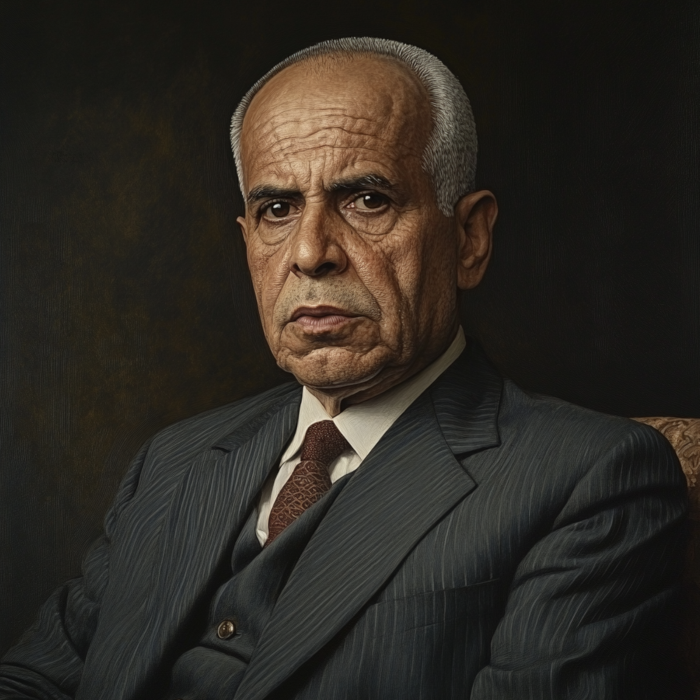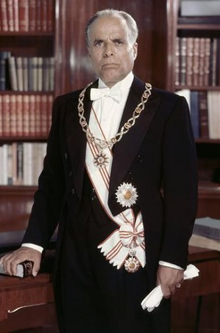


Habib Bourguiba (1903–2000) was a Tunisian statesman and the first President of Tunisia, serving from 1957 to 1987. Often referred to as the "Father of the Nation," Bourguiba played a crucial role in leading Tunisia to independence from French colonial rule and in shaping the modern Tunisian state. His presidency was marked by significant social and economic reforms, particularly in the areas of education, women's rights, and secularism, although it was also characterized by an increasingly authoritarian style of governance.
Early Activism: Upon returning to Tunisia, Bourguiba became involved in the nationalist movement against French colonial rule. In 1934, he co-founded the Neo Destour (New Constitutional Liberal Party), which sought independence for Tunisia through both political negotiation and popular mobilization.
Imprisonment and Exile: Bourguiba’s activism led to multiple imprisonments and periods of exile by the French authorities. Despite this, he continued to galvanize support for Tunisian independence, becoming the leading figure of the nationalist movement.
World War II and Post-War Period: During World War II, Bourguiba navigated the complex political landscape, avoiding alignment with either the Axis or Allied powers to maintain focus on Tunisia’s independence. After the war, he intensified his efforts, leading to increased tensions and negotiations with France.
Independence of Tunisia: On March 20, 1956, Tunisia gained its independence from France, largely due to Bourguiba’s leadership. He became the Prime Minister of the newly independent nation and, in 1957, following the abolition of the monarchy, was declared the first President of Tunisia.
Establishing a Secular State: Bourguiba's presidency was characterized by efforts to modernize Tunisia and create a secular state. He promoted the separation of religion from politics and education, encouraging a more progressive interpretation of Islam. Bourguiba’s secular policies sometimes put him at odds with more conservative elements within Tunisian society.
Women's Rights: One of Bourguiba’s most significant legacies is his work on women's rights. In 1956, he introduced the Code of Personal Status, a groundbreaking set of laws that granted women more rights than in many other Muslim-majority countries. The code outlawed polygamy, established legal equality between men and women, and promoted access to education and employment for women.
Education and Economic Development: Bourguiba invested heavily in education, believing it to be the cornerstone of Tunisia's modernization. He expanded access to primary and secondary education, built new schools and universities, and emphasized the importance of literacy. Economically, Bourguiba pursued state-led development policies, focusing on industrialization, infrastructure development, and agrarian reform.
Foreign Policy: Bourguiba maintained a policy of non-alignment during the Cold War, balancing relationships with both the Western and Eastern blocs. He was a proponent of Arab unity but often clashed with other Arab leaders over his moderate stance on issues like the Israeli-Palestinian conflict. Bourguiba advocated for a negotiated solution to the conflict, which was controversial among Arab states at the time.
Increasing Authoritarianism: Despite his early achievements, Bourguiba’s rule became increasingly authoritarian over time. He consolidated power, suppressed political opposition, and limited press freedom. The Neo Destour party, later renamed the Socialist Destourian Party (PSD), became the only legal political party, effectively making Tunisia a one-party state.
Cult of Personality: Bourguiba cultivated a cult of personality, often being portrayed as the savior of Tunisia. His image was ubiquitous in public spaces, and his leadership style became more autocratic as he aged. This authoritarianism was justified by the government as necessary for maintaining stability and progress.
Health Issues and the End of His Presidency: By the 1980s, Bourguiba's health had begun to decline, and his decision-making became increasingly erratic. Economic difficulties, social unrest, and rising Islamist opposition further destabilized his regime. In 1987, in what was described as a "medical coup," Prime Minister Zine El Abidine Ben Ali declared Bourguiba unfit to govern due to his health and assumed the presidency. Bourguiba was placed under house arrest in Monastir, where he remained until his death.
Death: Habib Bourguiba died on April 6, 2000, in Monastir. His death marked the end of an era in Tunisian history, and his legacy remains deeply influential in Tunisia’s national identity.
Legacy: Bourguiba is remembered as a visionary leader who laid the foundations for modern Tunisia. His efforts in education, women’s rights, and secular governance have had a lasting impact on Tunisian society. However, his authoritarian methods and the suppression of political pluralism have also been criticized, particularly in light of Tunisia's later struggles with democracy and human rights.
Commemoration: Bourguiba is widely revered in Tunisia, with numerous streets, squares, and institutions named after him. His birthplace, Monastir, is home to the Habib Bourguiba Mausoleum, a grand structure where he is buried, and which has become a site of national pilgrimage.
Habib Bourguiba's legacy is a complex one. While he is celebrated for his role in achieving Tunisian independence and his progressive reforms, particularly regarding women's rights and education, his authoritarian rule and the political repression that characterized much of his presidency are also integral parts of his history. Nonetheless, Bourguiba's vision for a modern, secular Tunisia continues to influence the country’s path in the 21st century.

We use cookies
We use cookies and other tracking technologies to improve your browsing experience on our website, to show you personalized content and targeted ads, to analyze our website traffic, and to understand where our visitors are coming from. Privacy Policy.